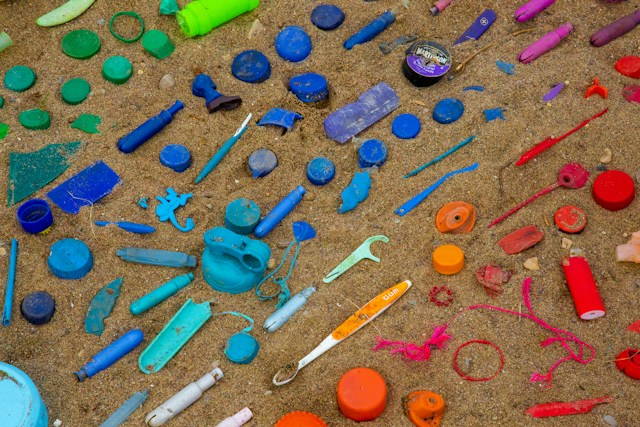

· By Brooke Hamilton-Benjestorf
What is Zero Waste, Exactly?
What exactly is Zero Waste? Is it a literal term? Is it a goal? Are there people who are able to live without creating any waste at all? If there are, how in this plastic world, do they do it? Do you have to be rich to achieve these sorts of goals? I know I’m not sure about all of this. Let’s investigate.
First, I think it’s important to acknowledge that creating waste is new. Ancient cultures were Zero Waste communities naturally. Their lifestyles were already built into the natural system, in tune with their animal selves and therefore the environment. Their lives were slow because they had to be, and they didn’t have synthetic materials to dispose of. Today, many of us see ourselves as other than animals, separate from nature. Though it isn’t true - we evolved on this planet the same way each and every organism did, despite our complicated brand of consciousness that so badly wants to claim our species as superior, special - the vast majority of us live as if we didn’t. We tend to not have respect for our origins - we’ve drifted far and quickly.
How, then, can we get back into this harmonious relationship with nature? The Zero Waste concept is a step in the right direction. The term Zero Waste was developed by Daniel Knapp in the early 80’s with his market Urban Ore, and his idea of Total Recycling, showing that in a real-life scenario, all types of waste can be diverted from the landfill [1]. (So, yes, it is possible! Turns out it takes more creativity than it does money.) Since then, his idea has been considered and adopted all around the world. The Zero Waste International Alliance defines it as “The conservation of all resources by means of responsible production, consumption, reuse, and recovery of products, packaging, and materials without burning and with no discharges to land, water, or air that threaten the environment or human health.” [2] When I read this definition carefully, I see opportunity. This, to me, feels doable, as long as I’m tuned into who is producing responsibly and tailor my buying appropriately. Well, that’s encouraging.
There are 5 basic concepts to follow, not unsimilar to the 3 R’s…in fact, they’re also R’s! Bea Johnson, a pied piper of the movement, lays them out of us: Refuse. Reduce. Reuse. Recycle. Rot. Refuse! I love this one because it hits us where it hurts. Just don’t buy it if you don’t need it or love it so much that you know you’ll use it until it dies its little product death - aka your sneakers disintegrating into shreds. This practice is also good for your brain. We over-purchase to fill the void that by definition cannot be filled. Stop throwing your money into the black hole of your heart. It’s not working. Spend your money on responsible products that are valuable and hold up, and bring you lasting joy. The rest of the R’s, I think, are self-explanatory, rot being the only other R outside of our classic three. Compost everything you can. If you’re lucky enough to live in Napa, you’re already covered. If you don’t live in a city that composts and your living situation can’t accommodate it, there are services that will pick up your compost for you and commence the rotting elsewhere. A quick internet search can surely hook you up with one of these do-gooders.
Now, the real question - how realistic is this? And I don’t mean how are we going to get everybody to do this? I’m a mother. I don’t kid myself that I actually have control over other humans and their outrageous-or-otherwise choices. I’m asking if it’s realistic for you - you who care, you who find joy in gently stewarding the earth. Can we do this in our lives? The thing is…we don’t have to worry about this! Why? Because everyone JUST TRYING would fix all of our eco problems. So start where you have control - your own life (I feel at least somewhat in control of myself some of the time) - and do your best. Doing your best in this context means retraining your brain. Slow down enough to look at what’s in your hands when you cross the kitchen to the garbage can. Can I use this for something else? Is this something I could save for an eco-brick?* Should I have bought the item that created this synthetic material I’m now having to figure out what to do with in the first place? I think that when you retrain your brain to be more thoughtful, you’ll be amazed at how infrequently you’re taking out the trash.
So just give it a try. Ease off the pressure and remind yourself that you’re doing everything and everyone a solid. Your brain. Your home. Your conscience. Your children and their children and their children and their children… Your planet. And if you start to feel overwhelmed, ask for help. People are excited about Zero Waste living! Reach out to neighbors, your local Zero Waste store, and if nothing else, the internet. There are bandwagons worth hopping on. Climb in and join us down the road to a more beautiful life.
*Tune into my next blog! I’ll be breaking down how exactly to make an eco-brick, something my 7-year-old is very excited about right now. Because it is exciting! Let’s make lovely things out of trash. I’ll meet you here next week to get our hands dirty - bring some plastic bottles! And if you’re so responsible and earthy that you don’t have any, go for a walk and bring a bag. Gather those gutter renegades for yourself, your community, and our Mother.
[1] https://www.zerowaste.com/blog/what-is-it-who-started-the-zero-waste-movement/